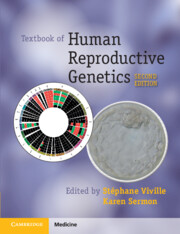Book contents
- Textbook of Human Reproductive Genetics
- Textbook of Human Reproductive Genetics
- Copyright page
- Contents
- Contributors
- Chapter 1 Basic Genetics and Cytogenetics: A Brief Reminder
- Chapter 2 Application of Whole-Genome Technologies to Assisted Reproductive Treatment
- Chapter 3 Meiosis: How to Get a Good Start in Life
- Chapter 4 Chromosomes in Early Human Embryo Development: Incidence of Chromosomal Abnormalities, Underlying Mechanisms, and Consequences for Diagnosis and Development
- Chapter 5 DNA Is Not the Whole Story: Transgenerational Epigenesis and Imprinting
- Chapter 6 Genes Are Not the Whole Story: Retrotransposons as New Determinants of Male Fertility
- Chapter 7 Chromosomal Causes of Infertility
- Chapter 8 Genetics of Human Male Infertility: The Quest for Diagnosis and Treatment
- Chapter 9 Genetics of Human Female Infertility
- Chapter 10 Preconception Genetics Analysis/Screening in IVF
- Chapter 11 Genetic Counseling in Assisted Reproductive Treatment
- Chapter 12 Mitochondrial Genetics in Reproductive Medicine
- Chapter 13 Preimplantation Genetic Testing
- Chapter 14 Epigenetics and Assisted Reproductive Technology
- Chapter 15 Human Reproductive Genetics in Medically Assisted Reproduction: Ethical Considerations
- Index
- References
Chapter 7 - Chromosomal Causes of Infertility
Published online by Cambridge University Press: 15 December 2022
- Textbook of Human Reproductive Genetics
- Textbook of Human Reproductive Genetics
- Copyright page
- Contents
- Contributors
- Chapter 1 Basic Genetics and Cytogenetics: A Brief Reminder
- Chapter 2 Application of Whole-Genome Technologies to Assisted Reproductive Treatment
- Chapter 3 Meiosis: How to Get a Good Start in Life
- Chapter 4 Chromosomes in Early Human Embryo Development: Incidence of Chromosomal Abnormalities, Underlying Mechanisms, and Consequences for Diagnosis and Development
- Chapter 5 DNA Is Not the Whole Story: Transgenerational Epigenesis and Imprinting
- Chapter 6 Genes Are Not the Whole Story: Retrotransposons as New Determinants of Male Fertility
- Chapter 7 Chromosomal Causes of Infertility
- Chapter 8 Genetics of Human Male Infertility: The Quest for Diagnosis and Treatment
- Chapter 9 Genetics of Human Female Infertility
- Chapter 10 Preconception Genetics Analysis/Screening in IVF
- Chapter 11 Genetic Counseling in Assisted Reproductive Treatment
- Chapter 12 Mitochondrial Genetics in Reproductive Medicine
- Chapter 13 Preimplantation Genetic Testing
- Chapter 14 Epigenetics and Assisted Reproductive Technology
- Chapter 15 Human Reproductive Genetics in Medically Assisted Reproduction: Ethical Considerations
- Index
- References
Summary
The genetic causes of male infertility are highly heterogeneous, and a large portion of these causes remains unexplained. More than 2300 testes-specific genes may contribute to male infertility [1]. Primary testicular disorders affecting spermatogenesis are commonly associated with abnormal semen parameters, including sperm concentration (oligozoospermia or azoospermia), morphology, motility, and vitality. Studies in infertile men have demonstrated that up to 20% carry constitutional chromosome aberrations [2–5]. Genomic aberrations found in these patients include numerical abnormalities, such as Klinefelter syndrome and its variants; XYY karyotype; testicular disorders of sex development, such as XX males; structural chromosome rearrangements, including Robertsonian translocations, balanced reciprocal translocations and inversions; as well as submicroscopic DNA copy number alterations (microdeletions and microduplications) encompassing genes associated with spermatogenesis or gonadal development.
- Type
- Chapter
- Information
- Textbook of Human Reproductive Genetics , pp. 99 - 115Publisher: Cambridge University PressPrint publication year: 2023



